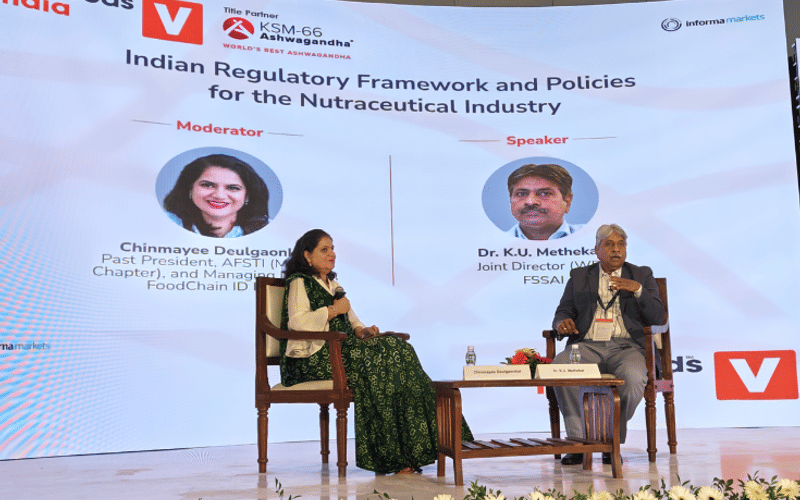Regulations in place, companies need to ensure efficacy of products
A 30-minute discussion on the inaugural day of Vitafoods India at the Jio Convention Centre highlighted the safety of consumers, as well as easy-to-read labels, healthy products, and customer efficacy.
06 Feb 2025 | By WhatPackaging? Team
India’s nutraceutical industry is experiencing rapid growth, contributing to approximately 67% of global nutraceutical exports. However, the sector faces significant regulatory challenges due to multiple governing bodies, sluggish approval processes, and lack of transparency. Food Safety and Standards Authority of India (FSSAI) is at the center of the debate, walking a tightrope regulating the nutraceuticals sector—products beyond food and before drugs. An engrossing session was hosted by Chinmayee Deulgaonkar, managing director, FoodChain ID India, who spoke to Dr Krishna Methekar, joint director of FSSAI.
Dr Methekar talked about the challenges of enforcement and how factory hygiene is seldom followed. He alluded to the factory floor having stagnant water in the manufacturing area, food handlers not wearing gloves, as well as labeling defects about manufacturing dates not mentioned on the pack. He also touched upon improper furnishing of research paper documents for ingredients and chemicals that were being used in the manufacturing process. In this context, he made an analogy to the auto-rickshaw (tuk-tuk) and said all three wheels of the vehicle need to work together—the regulator, the manufacturer, and the consumer.
One of the critical concerns raised was the overlap between pharmaceutical and food regulatory requirements. Deulgaonkar cited an example where a manufacturer needed an FSSAI license for food products and a drug license for pharmaceuticals, despite producing a single product through the same process. Dr Methekar acknowledged the challenges in demarcating facilities for pharmaceutical and nutraceutical production. But he urged industry players to establish separate units for long-term compliance.
Dr Methekar stressed the importance of backing up claims with scientific research and conducting efficacy studies about "the final product" rather than individual ingredients to meet regulatory standards. To address misleading claims, FSSAI has established an Advertising Monitoring Cell (AMC) to scrutinise product labels and advertisements. He urged companies to involve senior management and the FSSAI in regulatory decisions, rather than relying solely on marketing teams.
Deulgaonkar shared an anecdote from her auditing experience, where a manufacturer delayed printing expiry dates until orders were placed. This, she said, was a practice among "a few bad apples in the industry" which compromises consumer trust and regulatory compliance. Dr Methekar reiterated that while FSSAI regulations already incorporate stringent requirements, further improvements are underway to align with global standards.
Concluding the discussion, Deulgaonkar quoted Thomas Edison: “The doctor of the future will give no medication but will interest his patients in the care of the human frame, diet, and in the cause and prevention of disease.” She noted that the quote underscores the importance of nutraceuticals in shaping future healthcare. Dr Methekar traced the regulatory journey of nutraceuticals in India, beginning in 2016 when the sector was distinguished from the pharmaceutical industry and a High Court ruling directed FSSAI to develop regulations, ensuring a clearer framework for industry stakeholders. He highlighted FSSAI’s efforts to simplify compliance through digital applications, eliminating the need for physical visits.
The message from the discussion was the importance of clean and easy-to-read labels while purchasing a packaged food product. And today's consumers are smart because they know their health matters the most.


